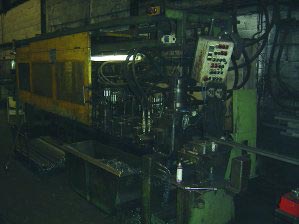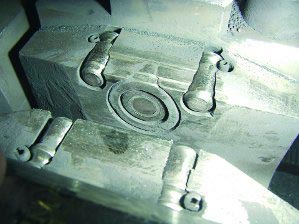Polymer gliding elements in harsh conditions
DryLin® R – maintenance-free linear technology for fence post manufacturerThe company Clotex in the French town of Renage makes fence posts for residential construction. As the air in the machinery is very dusty, no lubricants may be used in the production process. Dust is constantly produced from the rolling process, which is both abrasive and very fine. If just a small amount of lubricant came into contact with the dust, then a stringy mass would promptly arise. This would lead to galling and hence costly and time-consuming maintenance. That is why the company uses lubricant-free plastic bearings from igus®.
Romain Giroud, head of the technical department at Clotex: “Unlike ball and roller guide systems, the linear guide systems from igus® are self-lubricating and much more resistant to dirt, yet still have the same dimensions. ” The same applies for plain bearings versus ball bearings, says Giroud. For four years now Clotex has been relying on the so-called “DryLin® R” bearings from igus® under harsh, difficult environmental conditions. Says Giroud: “The bearings increase the service life of our equipment. We use less spare parts and save a lot of time on maintenance work. ” The igus® bearings with high performance polymer sliding elements “can be replaced much easier than ball bearings. ” DryLin® R linear bearings, consisting of a metal housing and a positive-fit inserted liner, can be used on all shaft materials.

Machine park of Clotex in Renage: black, abrasive dust everywhere: Use of drylin® linear guides instead of roller guides
The first Clotex machine equipped with igus® bearings was a punching machine that punches holes in the steel posts. With this application, the hole punches themselves are guided by the bearings. The output is 12,000 cycles/day at a speed of 1m/s. “The DryLin® R bearings therefore achieve a service life twice as long as conventional ball guides,” reports Romain Giroud. Based on this experience, Clotex also immediately produced the ejector's guide system on another machine using igus® bearings. “We now intend to use lubricant-free plastic bearings as standard on all our machinery – above all on our robots as well,” says Romain Giroud.
For even more difficult applications, for example in the concrete and stone industry, in the automotive sector (e.g. welding tongs), in the food industry (e.g. pasta on tracks that quickly stick together), in road construction, in the quarry industry or underground, igus® has more guide systems in its range besides the round guide systems. For example, a new version of the DryLin® T guide has now been developed, whose sliding elements are fixed with a positive fit by metal covers in the carriage.

Ejector, guided by self-lubricating “DryLin® R” bearings from igus®.